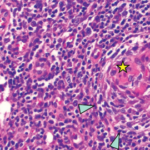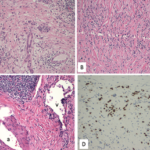The ACR’s advocacy efforts over the past year have helped put critical prior authorization and step therapy legislation in front of Congress. Learn more at ACR Convergence 2021.
Search results for: pediatric rheumatology

Case Report: Is It Castleman Disease, or Castleman-Like?
The difference between Castleman disease and Castleman-like disease may be subtle, but it comes with significant ramifications. Case Presentation This case involves a pregnant 19-year-old woman who presents over multiple hospitalizations with concerns for systemic lupus erythematosus and macrophage activation syndrome. At 36 weeks’ gestation, the patient’s weight had dropped from 215 lbs. to 170…

Healthcare Accessibility for People with Rheumatic Disease in New Haven, CT
The COVID-19 pandemic exacerbated wide disparities that exist in the U.S. healthcare system. During the pandemic, the clinical practice in the Section of Rheumatology, Allergy & Immunology at Yale School of Medicine (YSM), New Haven, Conn., rapidly pivoted from face-to-face visits to telehealth to keep our patients and providers safe. Many patients quickly adapted and…

Rheumatologists Saw a Gain in Compensation in 2020
Although patient volume temporarily declined due to the COVID-19 pandemic, rheumatologists saw a larger increase in compensation in 2020 than in 2019, according to a recent Medscape survey.

Case Report: Sarcoidosis in Patient with History of IgG4-Related Disease
Sarcoidosis and IgG4-related disease (IgG4-RD) are both immune-mediated, often multi-organ, diseases of uncertain etiology capable of presenting with diverse clinical manifestations. Many clinical features are common to both conditions, including hypergammaglobulinemia, the ability to form inflammatory masses and involvement of the lymph nodes, lacrimal glands, salivary glands, meninges and lungs. Although imaging modalities, such as…

A Look Back at the ACR’s Strong Response to COVID-19
We are now a year-and-a-half into the COVID‑19 pandemic, and rheumatologists and rheumatology professionals are still facing some of the same challenges that began in spring 2020, as well as new ones. Most recently, we learned that COVID‑19 vaccine efficacy is reduced in some patients on immunosuppressive therapies and the need for additional immunization is…

COVID-19 Disproportionately Stymies Women Researchers
The COVID-19 pandemic changed pretty much every facet of human activity, from home life to social interactions to the workplace. Medicine and research kept up a dizzying pace throughout the pandemic, with physicians and researchers working clinic hours even if they were able to use telemedicine to do some of their work from home. For…

Vasculitis Guidelines in Focus, Part 1: The Guideline Project
Sharon A. Chung, MD, MAS, director of the vasculitis clinic at the University of California, San Francisco, served as the principal investigator of the overall vasculitis guideline effort and talks about the process here.

ACR Update on Tocilizumab Shortages
ATLANTA—The ACR is actively engaged with the U.S. Food & Drug Administration (FDA) Center for Drug Evaluation and Research (CDER) drug shortage team as they work with the manufacturer to resolve current shortages of tocilizumab (Actemra). Demand for tocilizumab has outpaced supply, with demand increasing after the FDA’s June 24 Emergency Use Authorization (EUA) for…

Steven Echard Shares ACR Collaborative Plans at Florida Society Meeting
At the recent Florida Society of Rheumatology meeting, ACR executive vice president Steven Echard, IOM, CAE, emphasized the role of collaborations with state organizations in the ACR’s plans to modernize and expand its activities and offerings.
- « Previous Page
- 1
- …
- 65
- 66
- 67
- 68
- 69
- …
- 98
- Next Page »